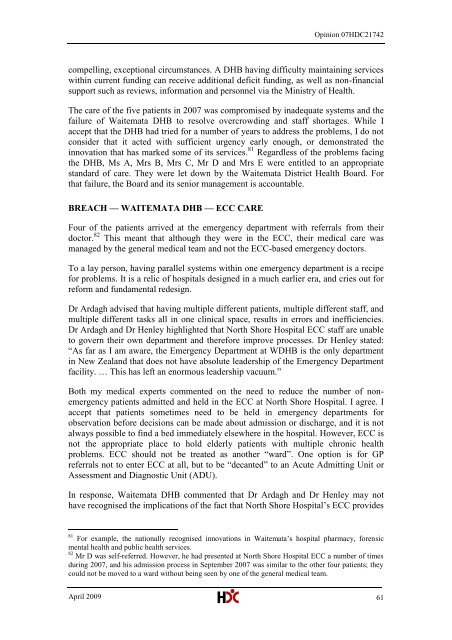North Shore Hospital report - New Zealand Doctor
North Shore Hospital report - New Zealand Doctor
North Shore Hospital report - New Zealand Doctor
You also want an ePaper? Increase the reach of your titles
YUMPU automatically turns print PDFs into web optimized ePapers that Google loves.
Opinion 07HDC21742compelling, exceptional circumstances. A DHB having difficulty maintaining serviceswithin current funding can receive additional deficit funding, as well as non-financialsupport such as reviews, information and personnel via the Ministry of Health.The care of the five patients in 2007 was compromised by inadequate systems and thefailure of Waitemata DHB to resolve overcrowding and staff shortages. While Iaccept that the DHB had tried for a number of years to address the problems, I do notconsider that it acted with sufficient urgency early enough, or demonstrated theinnovation that has marked some of its services. 81 Regardless of the problems facingthe DHB, Ms A, Mrs B, Mrs C, Mr D and Mrs E were entitled to an appropriatestandard of care. They were let down by the Waitemata District Health Board. Forthat failure, the Board and its senior management is accountable.BREACH — WAITEMATA DHB — ECC CAREFour of the patients arrived at the emergency department with referrals from theirdoctor. 82 This meant that although they were in the ECC, their medical care wasmanaged by the general medical team and not the ECC-based emergency doctors.To a lay person, having parallel systems within one emergency department is a recipefor problems. It is a relic of hospitals designed in a much earlier era, and cries out forreform and fundamental redesign.Dr Ardagh advised that having multiple different patients, multiple different staff, andmultiple different tasks all in one clinical space, results in errors and inefficiencies.Dr Ardagh and Dr Henley highlighted that <strong>North</strong> <strong>Shore</strong> <strong>Hospital</strong> ECC staff are unableto govern their own department and therefore improve processes. Dr Henley stated:―As far as I am aware, the Emergency Department at WDHB is the only departmentin <strong>New</strong> <strong>Zealand</strong> that does not have absolute leadership of the Emergency Departmentfacility. … This has left an enormous leadership vacuum.‖Both my medical experts commented on the need to reduce the number of nonemergencypatients admitted and held in the ECC at <strong>North</strong> <strong>Shore</strong> <strong>Hospital</strong>. I agree. Iaccept that patients sometimes need to be held in emergency departments forobservation before decisions can be made about admission or discharge, and it is notalways possible to find a bed immediately elsewhere in the hospital. However, ECC isnot the appropriate place to hold elderly patients with multiple chronic healthproblems. ECC should not be treated as another ―ward‖. One option is for GPreferrals not to enter ECC at all, but to be ―decanted‖ to an Acute Admitting Unit orAssessment and Diagnostic Unit (ADU).In response, Waitemata DHB commented that Dr Ardagh and Dr Henley may nothave recognised the implications of the fact that <strong>North</strong> <strong>Shore</strong> <strong>Hospital</strong>‘s ECC provides81 For example, the nationally recognised innovations in Waitemata‘s hospital pharmacy, forensicmental health and public health services.82 Mr D was self-referred. However, he had presented at <strong>North</strong> <strong>Shore</strong> <strong>Hospital</strong> ECC a number of timesduring 2007, and his admission process in September 2007 was similar to the other four patients; theycould not be moved to a ward without being seen by one of the general medical team.April 2009 61
















